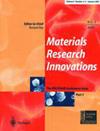钴基和钙基金属有机骨架(MOFs)是一种先进的超级电容器电极材料
Q2 Engineering
引用次数: 0
摘要
摘要采用溶剂热法合成了钴基和钙基金属有机骨架(Co- mof和Ca- mof) [Co (tpa) (Mi)和Ca (tpa)] (tpa =对苯二甲酸,Mi =甲基咪唑)。结构表征表明,金属中心同样被Co2+和Ca2+离子占据。利用循环伏安法(CV)、恒流充放电法和电化学阻抗谱法(EIS)在6 M KOH作为电解液中对合成的Co-MOF和Ca-MOF的超电容行为进行了评价。Co- mofs和Ca-MOFs在放电电流密度为1 Ag−1时的比电容分别为1726和185 Fg−1,具有良好的倍率性能,3000次循环后的电容保持率为97.4%。据我们所知,Co- mof和Ca-MOF在超级电容器中得到了应用,它们令人鼓舞的性能表明Co-/Ca-MOF可以作为超级电容器的高级电极材料。关键词:ca - mofco - mof电化学研究循环伏安法超级电容器披露声明作者未报告潜在利益冲突。本文章由计算机程序翻译,如有差异,请以英文原文为准。
Cobalt- and calcium-based metal–organic frameworks (MOFs) as an advanced electrode material for supercapacitors
ABSTRACTCobalt- and calcium-based metal–organic frameworks (Co-MOF and Ca-MOF) [Co (tpa) (Mi) and Ca (tpa)] (tpa = terephthalic acid and Mi = methyl imidazole) were synthesised through solvothermal method. Structural characterisation revealed that metal centres are equally occupied by Co2+ and Ca2+ ions. Supercapacitive behaviour of synthesised Co-MOF and Ca-MOF was evaluated using cyclic voltammetry (CV), galvanostatic charge/discharge, and electrochemical impedance spectroscopy (EIS) measurements in 6 M KOH as electrolyte. The Co- and Ca-MOFs exhibited outstanding specific capacitance of 1726 and 185 Fg−1 at a discharge current density of 1 Ag−1, good rate capability, and 97.4% capacitance retention after 3000 cycles. To the best of our knowledge, Co-MOFs and Ca-MOFs are used in supercapacitor, and their encouraging properties indicate that Co-/Ca-MOF can be a promising candidate as an advanced electrode material for supercapacitors.KEYWORDS: Ca-MOFCo-MOFelectrochemical studycyclic voltammetrysupercapacitor Disclosure statementNo potential conflict of interest was reported by the author(s).
求助全文
通过发布文献求助,成功后即可免费获取论文全文。
去求助
来源期刊

Materials Research Innovations
工程技术-材料科学:综合
CiteScore
5.20
自引率
0.00%
发文量
38
审稿时长
2.8 months
期刊介绍:
Materials Research Innovations covers all areas of materials research with a particular interest in synthesis, processing, and properties from the nanoscale to the microscale to the bulk. Coverage includes all classes of material – ceramics, metals, and polymers; semiconductors and other functional materials; organic and inorganic materials – alone or in combination as composites. Innovation in composition and processing to impart special properties to bulk materials and coatings, and for innovative applications in technology, represents a strong focus. The journal attempts to balance enduring themes of science and engineering with the innovation provided by such areas of research activity.
 求助内容:
求助内容: 应助结果提醒方式:
应助结果提醒方式:


